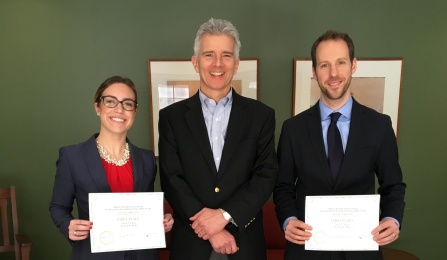Law Links - March 2017
UB team wins ABA regional competition

Olivia Paulo '17, coach Steve Sugarman ’85, and Andrew Mark ‘17
The hometown team came up big in the American Bar Association’s 18th annual regional mediation competition, held at UB School of Law on March 4 and 5, 2017.
The School of Law’s team of third-year students, Olivia Paulo and Andrew Mark, was named winner of the competition by a three-judge panel, edging out a team from William & Mary Law School. Paulo and Mark now move on to the national finals of the competition, held in April in San Francisco in conjunction with the spring meeting of the ABA’s Section of Dispute Resolution.
“When you’re advocating in mediation, it’s as much an art as it is a science,” says Steven R. Sugarman ’85, who teaches mediation at the School of Law as an adjunct professor and coaches the school’s mediation competitors. “It’s using soft skills, yet refusing to enter a deal without maximizing your client’s interests. This team has a beautiful balance of those skills.”
Law schools take turns hosting the regional competitions. At UB, the tournament was organized by Cheryl L. Tubinis, the school’s administrator for skills and special programs, and was judged by 35 volunteer attorneys. (Sugarman notes that the teams were identified only by letter, to avoid bias.)
A second School of Law team, third-year students Kasey Barrett and Daniel Muscarella, also competed, along with teams from the law schools of Hofstra, Fordham and Tulane universities, the University of South Dakota and Brooklyn Law School.
For the victors, who had previously competed together on a UB School of Law trial team, the result was the product of rigorous preparation and intense rounds of competition.
“These competitions are very subjective,” Paulo says, “but we put a lot of time and effort into it, and we work well together. There’s really no right way to do mediation. We spend a lot of time reflecting on our performance and skills and styles we used.”
She notes that the fact patterns of the cases at issue are distributed before the competition, but for the final round, competitors get a brand-new set of confidential facts and have to adjust their strategy accordingly. The final-round case revolved around a dispute over the use of a family-owned hotel and mansion situated on a large plot of land; a family wedding had been scheduled at the same time that an astronomy foundation had planned an event.
Time to call in the mediators. The competitors alternate serving as mediator and client, and in the final round, Paulo was the client. “It’s role-playing,” she says. “Part of it is using your personality to get into the role. You have to keep the judges interested in what’s going on.”
For his part, Mark says they had a strategy going into each 75-minute negotiating session, but “you never know what you’re going to get from the other side. If they put out a proposal that your partner or you really like, dealing with that dynamic can be tough sometimes.”
The judging, he says, looks at the techniques used and how well the mediator meets the client’s interest. “If you don’t leave the table worse off than when you sat down, that can be a win,” he says.
He credits the final result to the team’s thorough preparation – “the amount of time we spent thinking about the problems and all the different possible angles” – and their experience on trial teams together. “Both of us have a really good understanding of what our goals are,” Mark says. “We also learned a lot from round to round.”
In 16 years of competing in this regional competition, UB School of Law’s team has made it to the national finals only once before. In the San Francisco finals, it will be one of 10 teams competing.